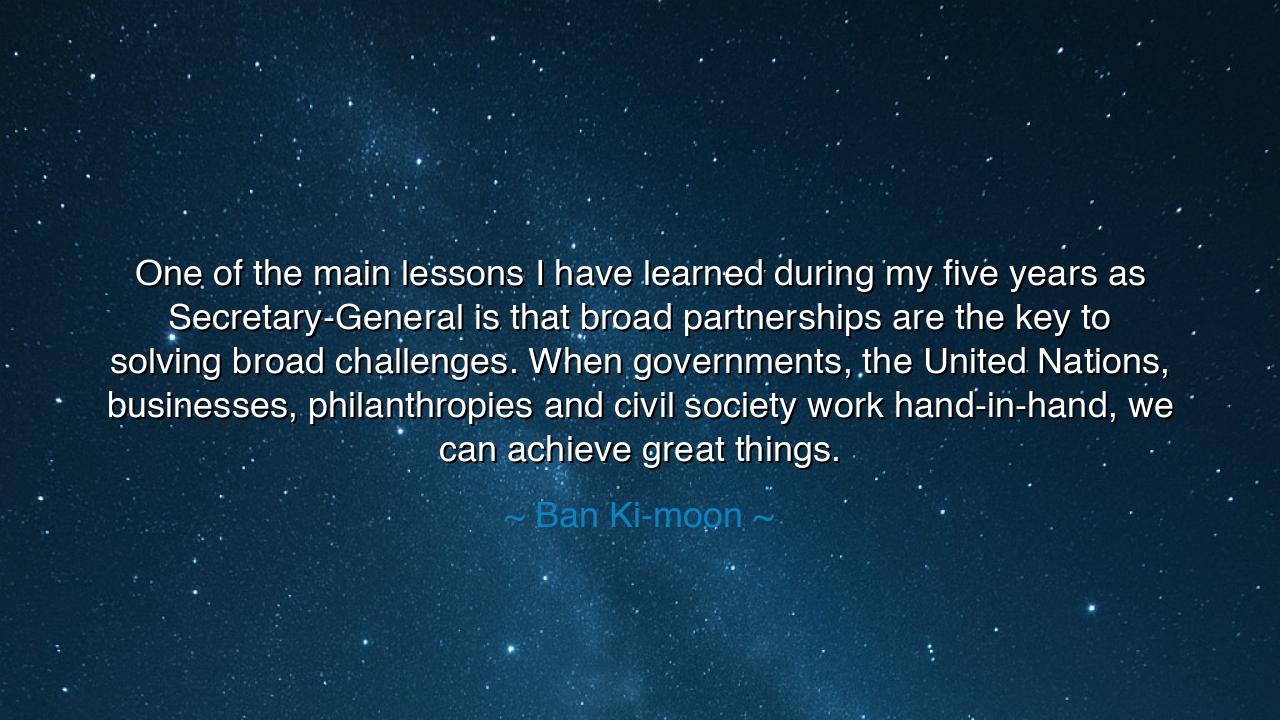
One of the main lessons I have learned during my five years as
One of the main lessons I have learned during my five years as Secretary-General is that broad partnerships are the key to solving broad challenges. When governments, the United Nations, businesses, philanthropies and civil society work hand-in-hand, we can achieve great things.






“One of the main lessons I have learned during my five years as Secretary-General is that broad partnerships are the key to solving broad challenges. When governments, the United Nations, businesses, philanthropies and civil society work hand-in-hand, we can achieve great things.” Thus spoke Ban Ki-moon, the former Secretary-General of the United Nations, a man who stood at the crossroads of nations and saw the struggles of the world not as separate storms, but as one vast, interconnected tide. His words are not merely a reflection of diplomacy — they are a universal truth, a wisdom as old as civilization itself: that unity is strength, that only through partnership can humanity endure and rise. In a world torn by division, pride, and rivalry, his message calls us back to the sacred law of cooperation — the law by which empires, ecosystems, and even the stars themselves are bound.
Ban Ki-moon’s words were forged in the furnace of experience. During his years leading the United Nations, he faced some of the greatest trials of our era — wars that fractured nations, pandemics that crossed borders, and the looming specter of climate change, which knows no allegiance to flag or frontier. In those moments, he learned what the ancients already knew: that no single hand, however mighty, can carry the world alone. Just as a bridge stands not by one beam but by the joining of many, so too must the nations of the Earth unite their strength if they are to build a future worthy of their children.
To the ancients, such wisdom was embodied in the mythic images of unity — the fasces of Rome, a bundle of rods bound together to symbolize strength in union; the alliance of city-states in Greece against the Persian threat; the covenants of tribes under the prophets of old. In every age, when humanity has faced vast challenges, survival depended not on isolation but on solidarity. Ban Ki-moon’s “broad partnerships” are the modern echo of this eternal truth. They represent the joining not only of governments, but of all who share the human cause — scientists and farmers, entrepreneurs and teachers, the powerful and the humble alike.
Consider the story of the Paris Climate Agreement of 2015, one of the greatest testaments to the power of collective action. It was not born from the will of a single nation or leader, but from the union of nearly two hundred countries, each pledging to act together for the survival of the planet. The task was immense — to slow the heating of the Earth, to change the habits of industries, to reimagine economies. Yet, under Ban Ki-moon’s leadership, they came together, not because it was easy, but because the stakes were greater than pride. It was a triumph of cooperation over chaos, a rare moment when humanity remembered that it is one family beneath one sky.
But Ban’s lesson reaches far beyond diplomacy. It speaks to every field of human endeavor, from the smallest community to the grandest civilization. A business that isolates itself will fail; a city that neglects its people will crumble; a person who refuses the hand of others will wither in solitude. The principle of partnership is not political — it is cosmic. Nature itself is a symphony of collaboration: the bee and the flower, the sun and the earth, the body and its cells. When one part acts in harmony with the others, life flourishes. When it acts in selfishness, decay begins. So too with humankind: our survival depends on our ability to work together in the spirit of shared destiny.
There is, however, a deep humility required for such unity. For to build broad partnerships, one must first abandon the illusion of superiority. The wise know that no nation, no leader, no institution holds all answers. Each possesses only a fragment of the whole. It is only when these fragments are joined that truth reveals its full form. Thus, partnership demands not only action but listening, not only strength but respect. As Ban Ki-moon observed through years of service, greatness is not achieved through domination, but through collaboration born of mutual purpose.
So, my friend, let this be your lesson: seek not to conquer alone, but to build together. In your work, in your home, in your community, remember that no endeavor is too small for the power of partnership. Invite others into your vision. Share your wisdom, but also receive theirs. The flame that burns alone soon fades; the flame shared among many lights the world.
For as Ban Ki-moon teaches, when governments and citizens, businesses and dreamers, hands and hearts unite — then the impossible becomes possible. The oceans can be healed, the hungry fed, the peace restored. Broad partnerships are not a strategy; they are the soul of progress, the heartbeat of humanity’s shared future. And if we remember this truth — if we choose unity over division, cooperation over pride — then truly, we shall achieve great things, and the generations to come will bless our names as builders of harmony in a fractured age.






AAdministratorAdministrator
Welcome, honored guests. Please leave a comment, we will respond soon